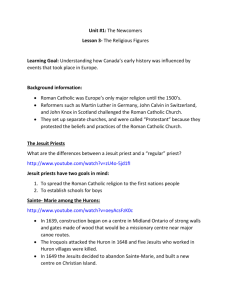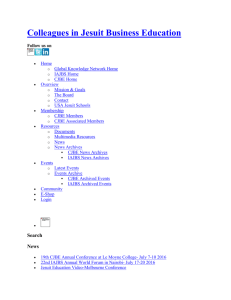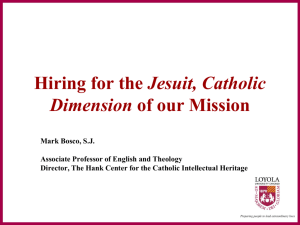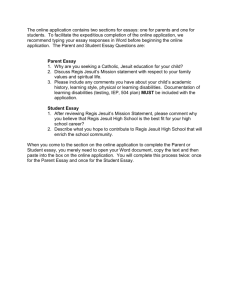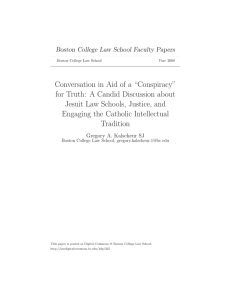Alignment of Core Curric
advertisement
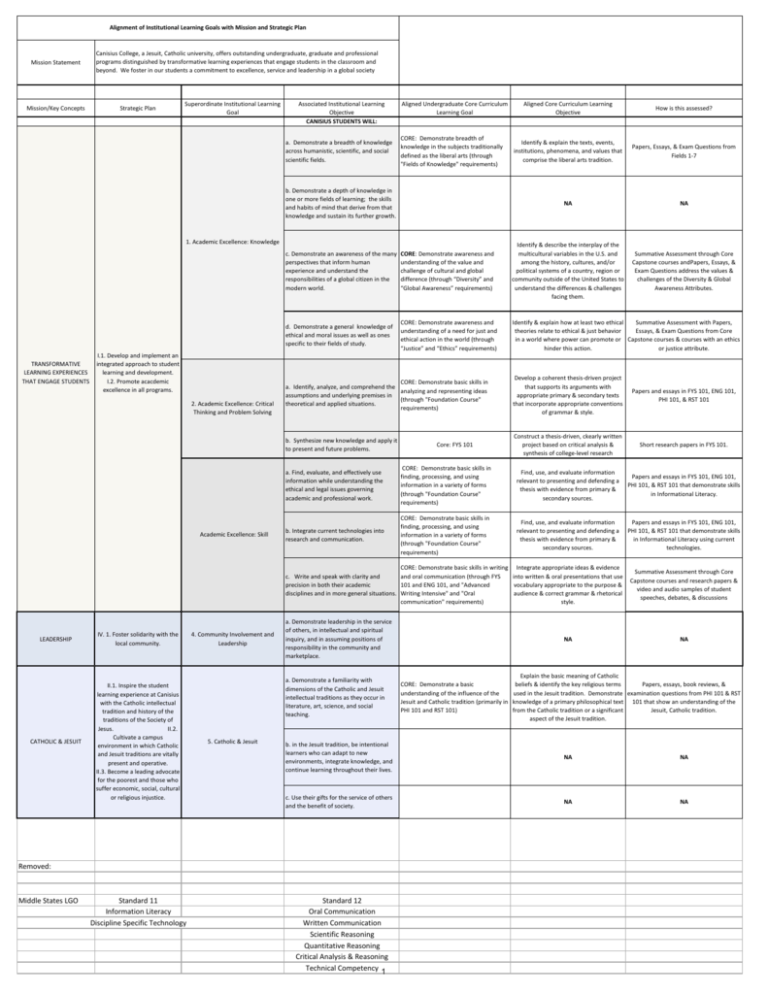
Alignment of Institutional Learning Goals with Mission and Strategic Plan Mission Statement Mission/Key Concepts Canisius College, a Jesuit, Catholic university, offers outstanding undergraduate, graduate and professional programs distinguished by transformative learning experiences that engage students in the classroom and beyond. We foster in our students a commitment to excellence, service and leadership in a global society Strategic Plan Superordinate Institutional Learning Goal Associated Institutional Learning Objective CANISIUS STUDENTS WILL: a. Demonstrate a breadth of knowledge across humanistic, scientific, and social scientific fields. Aligned Undergraduate Core Curriculum Learning Goal CORE: Demonstrate breadth of knowledge in the subjects traditionally defined as the liberal arts (through "Fields of Knowledge" requirements) b. Demonstrate a depth of knowledge in one or more fields of learning; the skills and habits of mind that derive from that knowledge and sustain its further growth. 1. Academic Excellence: Knowledge TRANSFORMATIVE LEARNING EXPERIENCES THAT ENGAGE STUDENTS I.1. Develop and implement an integrated approach to student learning and development. I.2. Promote acacdemic excellence in all programs. 2. Academic Excellence: Critical Thinking and Problem Solving Academic Excellence: Skill Aligned Core Curriculum Learning Objective How is this assessed? Identify & explain the texts, events, institutions, phenomena, and values that comprise the liberal arts tradition. Papers, Essays, & Exam Questions from Fields 1-7 NA NA Summative Assessment through Core Capstone courses andPapers, Essays, & Exam Questions address the values & challenges of the Diversity & Global Awareness Attributes. c. Demonstrate an awareness of the many perspectives that inform human experience and understand the responsibilities of a global citizen in the modern world. CORE: Demonstrate awareness and understanding of the value and challenge of cultural and global difference (through “Diversity” and “Global Awareness” requirements) Identify & describe the interplay of the multicultural variables in the U.S. and among the history, cultures, and/or political systems of a country, region or community outside of the United States to understand the differences & challenges facing them. d. Demonstrate a general knowledge of ethical and moral issues as well as ones specific to their fields of study. CORE: Demonstrate awareness and understanding of a need for just and ethical action in the world (through “Justice” and “Ethics” requirements) Identify & explain how at least two ethical Summative Assessment with Papers, theories relate to ethical & just behavior Essays, & Exam Questions from Core in a world where power can promote or Capstone courses & courses with an ethics hinder this action. or justice attribute. CORE: Demonstrate basic skills in a. Identify, analyze, and comprehend the analyzing and representing ideas assumptions and underlying premises in (through "Foundation Course" theoretical and applied situations. requirements) Develop a coherent thesis-driven project that supports its arguments with appropriate primary & secondary texts that incorporate appropriate conventions of grammar & style. Papers and essays in FYS 101, ENG 101, PHI 101, & RST 101 b. Synthesize new knowledge and apply it to present and future problems. Construct a thesis-driven, ckearly written project based on critical analysis & synthesis of college-level research Short research papers in FYS 101. Core: FYS 101 a. Find, evaluate, and effectively use information while understanding the ethical and legal issues governing academic and professional work. CORE: Demonstrate basic skills in finding, processing, and using information in a variety of forms (through "Foundation Course" requirements) Find, use, and evaluate information relevant to presenting and defending a thesis with evidence from primary & secondary sources. Papers and essays in FYS 101, ENG 101, PHI 101, & RST 101 that demonstrate skills in Informational Literacy. b. Integrate current technologies into research and communication. CORE: Demonstrate basic skills in finding, processing, and using information in a variety of forms (through "Foundation Course" requirements) Find, use, and evaluate information relevant to presenting and defending a thesis with evidence from primary & secondary sources. Papers and essays in FYS 101, ENG 101, PHI 101, & RST 101 that demonstrate skills in Informational Literacy using current technologies. CORE: Demonstrate basic skills in writing Integrate appropriate ideas & evidence c. Write and speak with clarity and and oral communication (through FYS into written & oral presentations that use precision in both their academic 101 and ENG 101, and "Advanced vocabulary appropriate to the purpose & disciplines and in more general situations. Writing Intensive" and "Oral audience & correct grammar & rhetorical communication" requirements) style. LEADERSHIP IV. 1. Foster solidarity with the local community. CATHOLIC & JESUIT II.1. Inspire the student learning experience at Canisius with the Catholic intellectual tradition and history of the traditions of the Society of Jesus. II.2. Cultivate a campus environment in which Catholic and Jesuit traditions are vitally present and operative. II.3. Become a leading advocate for the poorest and those who suffer economic, social, cultural or religious injustice. 4. Community Involvement and Leadership a. Demonstrate leadership in the service of others, in intellectual and spiritual inquiry, and in assuming positions of responsibility in the community and marketplace. a. Demonstrate a familiarity with dimensions of the Catholic and Jesuit intellectual traditions as they occur in literature, art, science, and social teaching. 5. Catholic & Jesuit Standard 11 Information Literacy Discipline Specific Technology NA Explain the basic meaning of Catholic CORE: Demonstrate a basic beliefs & identify the key religious terms Papers, essays, book reviews, & understanding of the influence of the used in the Jesuit tradition. Demonstrate examination questions from PHI 101 & RST Jesuit and Catholic tradition (primarily in knowledge of a primary philosophical text 101 that show an understanding of the PHI 101 and RST 101) from the Catholic tradition or a significant Jesuit, Catholic tradition. aspect of the Jesuit tradition. b. in the Jesuit tradition, be intentional learners who can adapt to new environments, integrate knowledge, and continue learning throughout their lives. NA NA c. Use their gifts for the service of others and the benefit of society. NA NA Removed: Middle States LGO NA Summative Assessment through Core Capstone courses and research papers & video and audio samples of student speeches, debates, & discussions Standard 12 Oral Communication Written Communication Scientific Reasoning Quantitative Reasoning Critical Analysis & Reasoning Technical Competency 1
